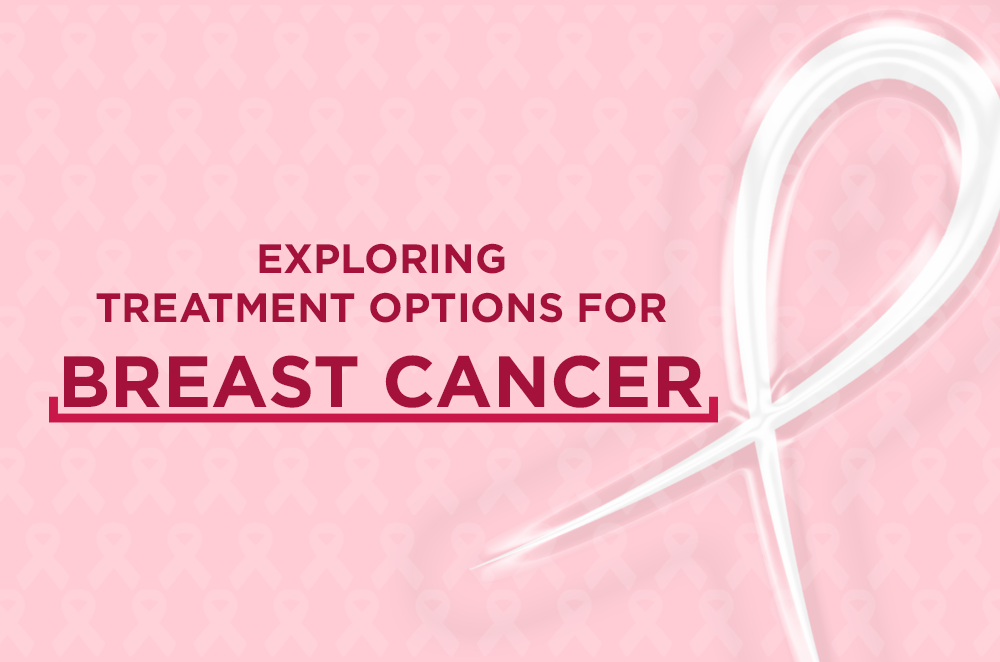Breast cancer is one of the most common forms of cancer worldwide, affecting millions of women and, in some cases, men. The good news is that, thanks to advancements in medical science and early detection methods, there are numerous effective treatment options available to combat this disease. The choice of treatment will depend on factors such as the stage of the cancer, its type, and the patient’s overall health. In this blog post, we’ll explore the various treatment options available for breast cancer.
Surgery
Surgery is often the initial step in treating breast cancer. Depending on the stage and type of cancer, surgeons may recommend different approaches, including
- Lumpectomy: Also known as breast-conserving surgery, this procedure removes only the tumor and a small margin of healthy tissue.
- Mastectomy: In some cases, the entire breast or both breasts may need to be removed. Women can opt for breast reconstruction after mastectomy.
- Breast Reconstruction: There are a few options for breast reconstruction depending on age, body type, and treatment plan.
- Lymph Node Biopsy: This procedure helps determine if the cancer has spread to the lymph nodes.
Radiation Therapy
Radiation therapy is frequently used after surgery to target any remaining cancer cells in the breast or lymph nodes. This treatment uses high-energy X-rays to target the affected area, reducing the risk of cancer recurrence. The schedule and duration of radiation therapy vary depending on the individual case.
Hormone Therapy
Many breast cancers are hormone receptor-positive, meaning they depend on hormones like estrogen to grow. Hormone therapy, also known as endocrine therapy, can block the effects of these hormones. Common hormone therapy options include tamoxifen and aromatase inhibitors, which are often prescribed for postmenopausal women.
Chemotherapy
Chemotherapy is a systemic treatment that uses drugs to destroy cancer cells throughout the body. It is often used in combination with surgery or radiation therapy and is particularly effective in cases where the cancer has spread beyond the breast. While chemotherapy can have side effects, advances in medical science have led to more targeted therapies that minimize these effects.
Targeted Therapies
Recent breakthroughs in cancer research have led to the development of targeted therapies that are designed to specifically target cancer cells, sparing healthy ones. These therapies are more precise and less toxic than traditional chemotherapy. Trastuzumab (Herceptin) and Pertuzumab (Perjeta) are examples of targeted therapies used for HER2-positive breast cancer. These therapies can be administered alone or in combination with chemotherapy.
Clinical Trials
Participating in clinical trials can offer patients access to cutting-edge treatments and therapies that are still in the experimental stage. These trials help advance the field of breast cancer research and may provide new hope for those with limited treatment options. Should a breast cancer clinical trial be a viable choice for your situation, your physician will outline the potential advantages and disadvantages of the trial treatment in comparison to the standard treatment. In collaboration with your healthcare team, you will need to make an informed decision regarding the most suitable treatment approach for your well-being.
Breast cancer is a complex disease, and the choice of treatment should be tailored to each patient’s specific circumstances. Advances in medical research have led to a wide array of options that offer hope and improved survival rates for those diagnosed with breast cancer. Early detection, personalized treatment plans, and emotional support are essential elements in the fight against breast cancer. If you or a loved one is facing a breast cancer diagnosis, consult with a healthcare professional to determine the most appropriate treatment plan based on your individual needs and circumstances. Remember, you are not alone in this battle, and there are a multitude of resources available to help you through every step of the journey.
Resources:
https://www.nationalbreastcancer.org/breast-cancer-surgery/
https://www.nationalbreastcancer.org/breast-reconstruction/
Disclaimer
The Comanche County Memorial Hospital website does not provide specific medical advice for individual cases. Comanche County Memorial Hospital does not endorse any medical or professional services obtained through information provided on this site, articles on the site or any links on this site.
Use of the information obtained by the Comanche County Memorial Hospital website does not replace medical advice given by a qualified medical provider to meet the medical needs of our readers or others.
While content is frequently updated, medical information changes quickly. Information may be out of date, and/or contain inaccuracies or typographical errors. For questions or concerns, please contact us at contact@ccmhhealth.com.

